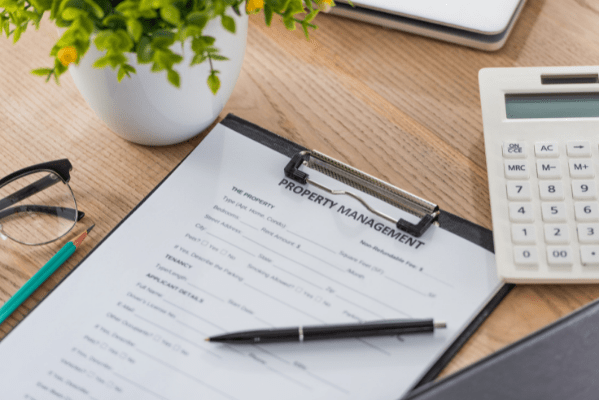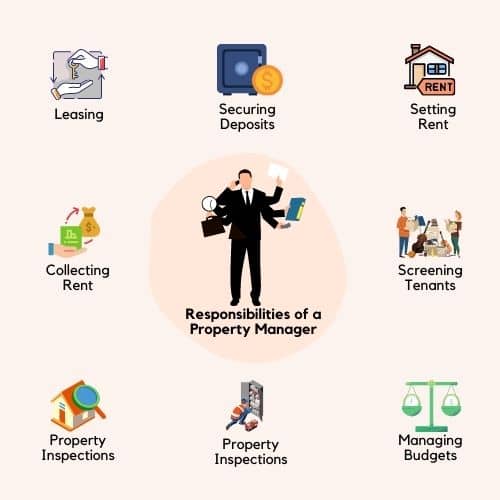What does a property manager do in real estate? Good question!
If you’re considering a career in property management, it’s essential to understand the roles and responsibilities of property managers. Property managers deal with landlords, tenants, and investors across the property market.
On the surface, property management may seem like an additional cost for convenience, and many owners manage their properties independently. However, the truth is; a reliable, organised property manager will save any landlord a lot of time and effort.
Residential property management refers to duties within rental properties, and commercial property management entails taking care of commercial spaces like retail centres, business offices, and apartment complexes. So, what does a property manager do in real estate, day to day?
What does a property manager do in real estate?
The primary role of the property manager is to oversee the management and maintenance of a single property. Property managers work on behalf of a single apartment owner rather than all the owners in an apartment block. Property managers are typically hired by property owners or real estate investors when they are looking to offload some of the responsibilities of managing a property.
Property manager job description
What does the average property manager job description look like? For starters, property managers need to have the relevant qualifications to work in management across residential and commercial real estate. An entry-level certificate course in property or real estate will provide a solid introduction into the world of real estate, instilling all critical skills required for property administration, marketing, and management. In Victoria, this means completing the Cert IV in Real Estate Practice, in NSW, you may complete the Assistant Agent Certificate – for a full breakdown of each real estate course in Australian states, contact Entry Education.
Once qualified as per your state’s requirements, once you have completed the recommended formal education, you will be able to work and operate as a property manager for an agency.
Roles and responsibilities of property managers
Residential property manager duties:
Tenants often confuse landlords and property managers – so, what’s the difference? The main difference between a property manager and a landlord is that the landlord owns the property; a property manager is a person who takes on the responsibility of managing the property. The property manager’s several responsibilities are expected to maintain listed below. However, there is a constantly changing set of demands within property management, dictated by the nature of the real estate industry.
Rent
One of the leading property management job requirements is to maximise the property’s return on the owner’s investment. Property managers need to carry out thorough property appraisals to determine the rental rates in the market. Ensuring an owner’s property appeals to tenants is vital in providing a steady flow of occupancy. However, the price must not drift too low either. A property manager should constantly monitor the market and offer the owner helpful advice on raising and lowering rental rates where required.
It is also the role of the property manager to ensure that the collection of the rent is done in a timely and efficient manner. Finally, the manager should be the one to follow up on any delays on tenancy payments.
Tenants
One of property managers’ most overlooked roles and responsibilities is finding suitable tenants. Whilst the issue of rent collection is also part of the role, tackling this issue beforehand by finding good tenants is critical. An effective property manager will implement a thorough screening process for tenants to ensure no difficulties down the line.
The property manager will maintain the listings for properties, organise the inspections for potential tenants, prepare the tenancy agreements, and manage and collect any rental income. Other property management functions include liaising with tradespeople to schedule the upkeep or repair of the property as needed. The property managers will address any owner or tenant concerns and handle all contracts related to the property.
The laws and regulations relating to tenants are fundamental. Both parties must avoid outstepping the legal boundaries outlined in any landlord-tenant relationship. Property managers need to stay updated on these laws and continually apply them to the properties to avoid serious ramifications.
Inspections
Property managers should conduct routine inspections of the property to ensure the owner is kept up to date on the property’s condition. Developing inspections reports is vital to informing the owner of any required repairs in both the short and long term. These are incredibly important in the owners budgeting and future maintenance costs.
Property maintenance
An inevitable part of owning a property is the ongoing maintenance and repairs to ensure it is in good condition for your tenants and maintain value. If you’ve engaged a property manager, your manager will be the one handling any necessary maintenance and care promptly. Experienced property managers will have a network of contractors like electricians and plumbers that they can call on short notice to help fix any issues in the property.
Part of owning an investment property involves ongoing property maintenance and repairs to ensure that your property is in tip-top shape and your tenants are happy. A great property manager will maintain efficient communication with your tenant to ensure they’re on top of these issues and liaise with a network of trusted technicians and tradies to ensure you’re getting the most competitive price.
Commercial property manager duties:
The roles and responsibilities of a property manager in a commercial sense are very similar to those in a residential. However, there will be a few larger-scale decisions involved.
When purchasing a commercial investment property like a retail complex or large office block, the main goal is to generate a steady income. Large scale commercial properties such as this require a lot of day-to-day organisation in order to produce and manage revenue. Leasing the property out to commercial tenants requires more responsibilities than residential property. OHS and fire regulations need to be upheld. The setting of optimal rent to maximise profits. Trustworthy property managers can provide strategic management that will be crucial to the success of any commercial property.
Commercial Property Management Functions typically involve overseeing several buildings for a property management company. Managers are legally obligated, along with the owners, to keep the property safe for both tenants and the public. This can be provided by:
- Routine inspections
- General maintenance as well as preventative
Why will a landlord hire a property manager?
The obvious advantage to hiring a quality property manager is that it lessens the load on the owner and removes the requirement that they are nearby and heavily involved with the property. Becoming a property manager is a full-time job and frankly, the answer to “what does a property manager do in Real Estate?” is not always fully understood.
If you manage multiple properties, you will find that each differs from the other. Tenant issues vary from tenant to tenant. Whether you find yourself working for yourself or a property management company, there is a lot of work involved day-to-day, as well as overtime and emergencies. Taking these responsibilities allows the owner to focus on their investments into other properties.
Become a property manager with Entry Education
Taking the first step in becoming a property manager is incredibly exciting, and it will see you develop many new skills. It is a constantly growing industry, emphasising those who are organised and with excellent people skills. If you’re considering a career in property management, get started today with Entry Education’s leading Real Estate Courses. Wherever you’re located in Australia, Entry Education provide flexible, online, and seamless studying options to get you in the industry. Contact our friendly team for more information on courses, certificates, and programs relating to property management!
















